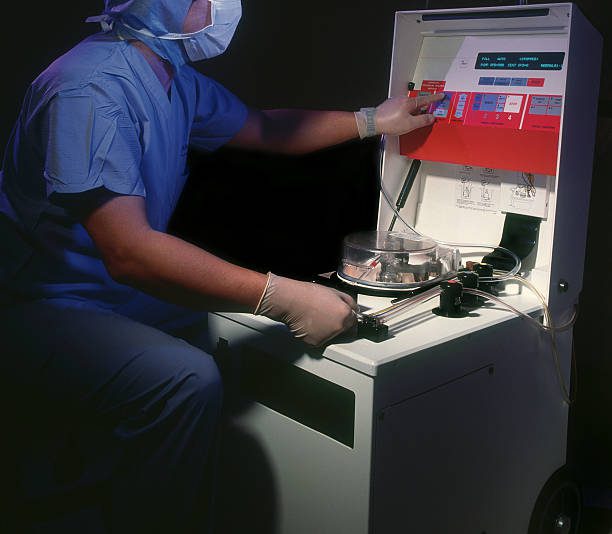
| Dialysis Technician Key Stats | |
|---|---|
| Education | 1-2 Years |
| Job Outlook | 11% |
Dialysis Technicians help provide services to patients whose kidneys aren’t able to perform their normal functions.
Healthy kidneys play an important role in a person’s body.
One of their functions is to clean out all the impurities floating in the bloodstream.
When someone has malfunctioning kidneys, there is no way for the blood to get cleaned causing various other problems for a person’s health.
When a doctor diagnoses a patient with malfunctioning kidneys, they can suggest a Dialysis treatment in order to replace the normal functions their kidneys are unable to perform.
A patient whose doctor requests a dialysis treatment will make appointments to see a Dialysis Technician who will perform the procedure.
Potential Dialysis Technicians should not only be able to perform medical tasks, they should also be able to work well with patients who are sick in order to provide treatment; they will provide dialysis procedures to patients with kidney disease and renal failure whose kidneys have shut down.
Table of Contents
Education Requirements to Become a Dialysis Technician
Community colleges and vocational schools offer degrees for people who want to become a Dialysis Technician.
Throughout a program, a student will learn medical information that is either general or more specific to Dialysis Treatment.
Information specific to being a Dialysis Technician includes learning how to access the veins, taking a patient’s vital signs and learning how to monitor any potential problems.
Students will be able to learn how to become a Dialysis Technician not only through traditional learning such as in a classroom, they will also acquire hands on experience by training in a laboratory or clinic.
Candidates wanting to become a Dialysis Technician need certification in order to get hired for a job and can better prepare for a certification exam by taking a recommended Dialysis program.
Candidates must seek certification from the Board of Nephrology Examiners Nursing and Technology (BONENT).
Specific laws vary by state but certification is needed in all states in order to work as a Dialysis Technician.
Recertification also depends on each individual state but typical qualifications for retesting include taking continuing education classes in order to renew licensure every two to four years.
Candidates can also become licensed by taking the Certified Clinical Hemodialysis Technician (CCHT) certification exam.
Requirements needed to take this certification include having a high school diploma or GED as well as having clinical experience or training.
Visit: Certified Clinical Hemodialysis Technician for detailed information on how to become a Certified Tech.
Students should also learn the various types of dialysis that require different equipment and techniques in order to perform the procedure.
Listed are the primary and secondary types of dialysis:
- Primary – Hemodialysis
- Primary – Peritoneal Dialysis
- Primary – Hemofiltration
- Secondary – Hemodiafiltration
- Secondary – Intestinal Dialysis
Dialysis Technician Job Description
Dialysis Technicians work with patients who have renal disease or kidney failure and help them clean the blood in their bodies by using specialized medical equipment.
These professionals not only have to use the sophisticated equipment needed in order to complete the treatment, they also have to work with people are sick; they must be able to work well with patients and stay calm under strenuous circumstances.
Dialysis Technicians work at hospitals, Dialysis Centers or doctor’s offices usually under the supervision of a Physician or Registered Nurse.
Some typical procedures a Dialysis Technician performs on a daily basis can include:
- Sets up equipment for Dialysis
- Prepares formulas for intravenous use
- Takes patient vital signs such as: temperature, blood pressure, pulse and weight before and after treatment
- Explain Dialysis procedure to new patients to alleviate worry and stress
- Monitors patient throughout the procedure
Dialysis Technician Salary and Career Path
The salary range for Dialysis Technicians begins at approximately $26,000 to $38,000 annually.
Wages vary by state and depends on the facility a Dialysis Technician works from.
Careers in the medical industry are expected to grow at a faster rate than in other industries.
In fact, the Bureau of Labor Statistics (BLS) predicts a growth of 16% for laboratory technicians including dialysis specialists, which is higher than expected growth for other industries.
This means more job opportunities for people interested in becoming a Dialysis Technician and similar professions.
![]() The below information is based on the 2023 BLS national averages.
The below information is based on the 2023 BLS national averages.
National Average Salary
$43,350Average Salary by State
| State | Avg. Annual Salary |
|---|---|
| Alabama | $34,160 |
| Alaska | $52,530 |
| Arizona | $43,140 |
| Arkansas | $35,560 |
| California | $50,900 |
| Colorado | $46,270 |
| Connecticut | $46,630 |
| Delaware | $41,340 |
| District of Columbia | $50,110 |
| Florida | $40,530 |
| Georgia | $39,640 |
| Hawaii | $47,840 |
| Idaho | $42,110 |
| Illinois | $42,790 |
| Indiana | $42,260 |
| Iowa | $42,660 |
| Kansas | $39,020 |
| Kentucky | $37,090 |
| Louisiana | $33,610 |
| Maine | $44,580 |
| Maryland | $44,100 |
| Massachusetts | $48,570 |
| Michigan | $39,840 |
| Minnesota | $49,740 |
| Mississippi | $34,630 |
| Missouri | $39,230 |
| Montana | $43,230 |
| Nebraska | $42,280 |
| Nevada | $41,390 |
| New Hampshire | $45,490 |
| New Jersey | $45,190 |
| New Mexico | $39,020 |
| New York | $47,350 |
| North Carolina | $40,880 |
| North Dakota | $40,320 |
| Ohio | $39,620 |
| Oklahoma | $37,480 |
| Oregon | $49,390 |
| Pennsylvania | $42,090 |
| Rhode Island | $43,580 |
| South Carolina | $38,520 |
| South Dakota | $37,760 |
| Tennessee | $38,860 |
| Texas | $38,870 |
| Utah | $41,290 |
| Vermont | $44,710 |
| Virginia | $42,010 |
| Washington | $53,780 |
| West Virginia | $34,660 |
| Wisconsin | $45,160 |
| Wyoming | $40,810 |
| Guam | $30,560 |
| Puerto Rico | $27,060 |
| Virgin Islands | $37,380 |
The top earning state in the field is Washington, where the average salary is $53,780.
These are the top 5 highest-paying states in the field:
* Employment conditions in your area may vary.
Frequently Asked Questions
What is a dialysis technician?
Dialysis technicians are responsible for operating the machines that perform dialysis and to monitor the patients during treatment.
Dialysis is used when the kidneys are no longer able to remove waste from the blood and excess fluids from the body due to disease or kidney failure.
Dialysis is a treatment that lasts around 4 hours and during this time dialysis technicians have the responsibility to monitor the patient’s vital signs and adjust the rate at which the dialysis machine removes fluid.
Dialysis technicians also assemble the dialysis machine, make sure the equipment is working properly and administer local anesthesia.
They are required to write reports for the physician who has recommended the procedure.
Dialysis technicians are trained to respond to emergency situations that may occur during the treatment.
To minimize the risk of infection, dialysis technicians must follow very strict sanitation procedures.
Dialysis technicians need attention to detail, compassion, communication skills but also patience and physical stamina.
They are supervised by a physician or a registered nurse and usually work in hospitals and clinics but may also work at patients’ homes.
Dialysis technicians may work full-time or part-time.
How much does a dialysis technician make?
According to the Bureau of Labor Statistics, clinical laboratory technologists and technicians can make anywhere between less than $30,000 and more than $80,000.
How much a dialysis technician makes depends on his or her level of experience and education but also on the region and the employer.
How much does it cost to become a dialysis technician?
Dialysis technicians typically need a high school diploma but graduating from a post-secondary program and having some clinical experience will give you better job prospects.
An associate’s degree in dialysis technology or a similar field teaches the science behind the dialysis procedure but also focuses on teaching students the practical skills needed for entry-level employment in this field.
Dialysis technician school can cost anywhere between $4,000 and more than $20,000, depending on the school and the program itself.
Dialysis technicians may also learn the skills needed to perform this procedure through on-the-job training but most employers prefer candidates who have graduated from an accredited program.
What is the demand for dialysis technicians?
According to the Bureau of Labor Statistics, the demand for clinical laboratory technologists and technicians, in general, is expected to grow 11 percent from 2018 to 2028.
Dialysis technicians will continue to be needed in order to operate dialysis equipment and to monitor patients who undergo this 4-hour procedure.
Employment opportunities vary depending on the region and having a degree or a post-secondary diploma in this field will give you better job prospects.
How long does it take to become a dialysis technician?
If you want to become a dialysis technician, an associate’s degree or diploma in dialysis technology or nephrology will teach you the science behind dialysis and will equip you with the skills needed to start a career in this field.
Associate’s degree programs can typically be completed in around 2 years and can help you find entry-level employment as a dialysis technician.













